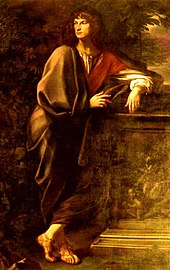Robert Spencer, 2nd Earl of Sunderland

Robert Spencer, 2nd Earl of Sunderland , (born September 5, 1641 in Paris , † September 28, 1702 in Althorp ) was an English diplomat and politician . He was one of the most influential advisers among three English kings. Since he was not loyalty to political parties , he was also very unpopular.
Life
He was the son of Henry Spencer, 1st Earl of Sunderland (1620–1643), who fell on the side of the Royalists in the First Battle of Newbury in the English Civil War , and of Lady Dorothy Sydney, daughter of Robert Sidney, 2nd Earl of Leicester . After the early death of his father, he inherited his title as 2nd Earl of Sunderland and 4th Baron Spencer of Wormleighton . Robert Spencer attended Christ Church College at Oxford University and was then captain in a cavalry regiment under Ruprecht von der Pfalz, Duke of Cumberland . In 1671/72 he was ambassador in Madrid , in 1672/73 in Paris and in 1673 in the Netherlands . From 1673 to 1679 he was Gentleman of the Bedchamber and then became a member of the Privy Council of Charles II. From 1679 to 1688 he was alternately secretary of the Northern or Southern Department in the Foreign Ministry, i.e. foreign minister. Under Charles II he was the architect of pro-French foreign policy. In 1681 he fell temporarily out of favor because of his support for the Exclusion Bill (exclusion of the later Jacob II, brother of Charles II, from the line of succession, as he was Catholic). At times he was Lord President of the Council and Lord Lieutenant of Warwickshire and in 1687 he was accepted into the Order of the Garter as a Knight Companion . Under James II he supported his pro-Catholic policies and converted to Catholicism himself in 1687 (which won him the favor of the queen), but then fell out of favor and was dismissed in 1688 (the king himself attempted more public support by dismissing the unpopular Spencer to obtain). After the Glorious Revolution , he fled to the Netherlands. But he also tried again to get in touch with the circles around Wilhelm III. and in 1690 he was allowed to return to England after becoming Anglican again. From 1693 he was an influential political advisor to Wilhelm III. Among other things, he advised him to get his ministers from the Whig party , was an intermediary between the King and Parliament and reconciled him with the future Queen Anne . His reputation was further damaged around this time when his son-in-law Donough MacCarthy, 4th Earl of Clancarty , a leading Jacobite , escaped from the Tower in the winter of 1697/98 . He convinced his bride (the marriage had been arranged when they were very young) to join him, but her brother found out about it and had him arrested. Finally, the king, who was rather amused by the scandal, allowed the couple to leave for Altona .
In 1697 he became Lord Chamberlain of the Household , but was pushed out of office after a short time under pressure from the Whigs, was one of the Lord Justice for a short time and withdrew completely from political life in 1697 and lived in seclusion in Althorp.
His private life was not very wasteful and he was not known for a dissolute life compared to many high nobles at the court of the Stuarts, but he had a penchant for gambling, which sometimes caused him financial problems, and was an art collector. He had a quick temper and never minced words, which made him many enemies, but he was also able to make and maintain friendships.
Marriage and offspring
On June 10, 1665 he married Lady Anne Digby († 1715), the daughter of George Digby, 2nd Earl of Bristol . They had two sons and two daughters:
- Lord Robert Spencer (1666-1688);
- Lady Anne Spencer (1667–1690) ⚭ 1687 James Hamilton, 4th Duke of Hamilton ;
- Lady Elizabeth Spencer (around 1673–1704) ⚭ 1684 Donogh MacCarty, 4th Earl of Clancarty ;
- Charles Spencer, 3rd Earl of Sunderland (1674-1722).
His title of nobility was inherited in 1702 by his only surviving son Charles.
literature
- WA Bacon: Spencer, Robert, second earl of Sunderland (1641-1702). In: Oxford Dictionary of National Biography . 2008 ( online ).
- John Philipps Kenyon : Robert Spencer, Earl of Sunderland 1641–1702. Longmans Green and Co., London 1958.
- Sunderland, Robert Spencer, 2nd Earl of . In: Encyclopædia Britannica . 11th edition. tape 26 : Submarine Mines - Tom-Tom . London 1911, p. 99–100 (English, full text [ Wikisource ]).
Web links
- John S. Morrill: Robert Spencer, 2nd Earl of Sunderland. at Encyclopædia Britannica Online
- Robert Spencer, 2nd Earl of Sunderland on thepeerage.com
| predecessor | Office | successor |
|---|---|---|
| Edward Montagu | English ambassador to Madrid 1671–1672 |
Henry Goodricke |
| James Scott |
Lord Lieutenant of Staffordshire 1679–1681 |
Charles Talbot |
| Edward Conway |
Lord Lieutenant of Warwickshire 1683–1686 |
George Compton |
| George Savile |
Lord President of the Council 1685–1688 |
Thomas Osborne |
| George Compton | Lord Lieutenant of Warwickshire 1687–1689 |
George Compton |
| Charles Sackville |
Lord Chamberlain of the Household 1695-1699 |
Charles Talbot |
| Henry Spencer |
Earl of Sunderland 1643-1702 |
Charles Spencer |
| personal data | |
|---|---|
| SURNAME | Spencer, Robert, 2nd Earl of Sunderland |
| ALTERNATIVE NAMES | Sunderland, Robert Spencer, 2nd Earl of |
| BRIEF DESCRIPTION | English diplomat and politician |
| DATE OF BIRTH | September 5, 1641 |
| PLACE OF BIRTH | Paris |
| DATE OF DEATH | September 28, 1702 |
| Place of death | Althorp |

